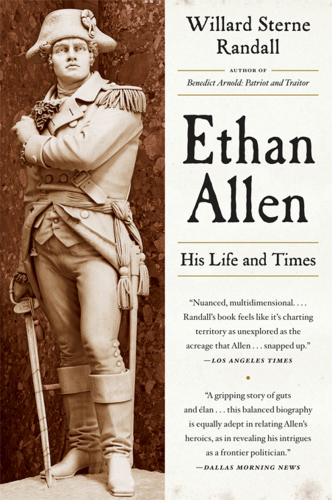
Ethan Allen
His Life and Times
- اطلاعات
- نقد و بررسی
- دیدگاه کاربران
نقد و بررسی

Starred review from March 14, 2011
The brash, multifaceted ebullience of the United States at its birth comes through in this rich portrait of Ethan Allen (1738â1789), one of its iconic founders. Historian Randall (Benedict Arnold: Patriot and Traitor) gives us a complex, protean Allen: strapping frontiersman; cunning entrepreneur; rationalist philosophe whose deistic manifesto scandalized Puritan divines and influenced Thomas Paine; amateur soldier whose impetuosity led to the capture of Fort Ticonderoga, the first strategically significant American victory of the Revolution, and later to disaster; finally, he was a Machiavellian politician who played the British off against the Continental Congress. Allen's saga was founded on a giant real estate swindleâthe royal governors of New Hampshire and New York sold the territory of modern-day Vermont twice, to rival cliques of developersâthat took on insurrectionary dimensions as he led his Green Mountain Boys militia against absentee landlords trying to evict settlers (a project that handily benefited his own byzantine land deals); the result, as Allen trod "a blurred line between land speculator and latter-day Robin Hood," was a new style of politics mixing populist ideals with canny corruption. Randall incorporates a wealth of research and colorful detail into an absorbing, well-paced narrative that highlights Allen's distinctively American energiesâand contradictions.16 pages of illus.

Starred review from May 1, 2011
Randall (History/Champlain Coll.; Alexander Hamilton: A Life, 2003, etc.) delves beneath the myth to fashion the definitive biography of the frontier hero and founder of Vermont.
Best known for leading his paramilitary Green Mountain Boys on a daring attack on British-held Fort Ticonderoga, at Lake Champlain, on May 10, 1775—the first American action in the Revolutionary War—the charismatic Allen was a Connecticut-born farmer, businessman and politician who would become an American folk hero. Self-educated, foul-mouthed and over six feet tall (unusual for the time), he was celebrated for his legendary physical prowess. He could lift a bushel bag full of salt with his teeth and throw it over his head, the stories said. "He was a Paul Bunyan before Bunyan ever existed," writes Randall. When Allen first moved to Vermont in 1770, the territory was claimed by both the colonies of New Hampshire and New York. Determined to see Vermont become part of New England, where he owned land, Allen and his militia waged a five-year campaign of intimidation to drive away New York settlers. This same rag-tag band of Vermont farmers and hunters took Ticonderoga, without the Continental Congress's approval, shortly after hostilities began at Lexington and Concord. Randall's authoritative, vivid book is especially good on Allen's nearly three-year imprisonment after his failed attack on Montreal in 1775. Harshly treated, first in England and then in New York, he was finally released in a prisoner exchange. He then served Vermont as commander of the militia, chief diplomat to the Continental Congress and advisor to the governor. "The war hero, the counselor of state, he became the public face of Vermont, inside and outside the republic," writes the author. Allen's prison memoir was a bestseller during the Revolutionary era.
Colorful, well-written and nuanced.
(COPYRIGHT (2011) KIRKUS REVIEWS/NIELSEN BUSINESS MEDIA, INC. ALL RIGHTS RESERVED.)

September 1, 2011
In this work, Randall (history, Champlain Coll.) presents Ethan Allen as much more than the hero of Fort Ticonderoga, leader of the Green Mountain Boys, and founder of Vermont. A contradictory character, Allen is shown here as the outspoken defender of New York land-grant settlers against land speculators but also as a land speculator himself; as a principled champion of justice and liberty while still an ambitious, glory-seeking opportunist; as a riotous and impetuous frontiersman as well as a self-educated philosopher and religious iconoclast. Randall effectively explains Allen's beliefs and actions by chronicling the economic, religious, and political developments in Colonial New England that shaped Allen and fomented the atmosphere of rebellion before and after 1775. VERDICT The relaxed narrative is supported by valuable primary documents and secondary sources, but Randall ignores Michael Bellesiles's Revolutionary Outlaws: Ethan Allen and the Struggle for Independence on the Early American Frontier (1993). Of greater concern, upon viewing the first submitted galley for the book, LJ pointed out to the publisher that certain passages closely followed Charles Jellison's Ethan Allen: Frontier Rebel (1969). The book has since been revised for publication, yet the new version still contains some passages that echo Jellison's narrative patterns. Nonetheless, this biography of a larger-than-life adventurer and flawed hero will be enjoyed by readers of popular histories about the country's early years, and by serious researchers in Vermont, Connecticut, New Hampshire, and New York history.--Margaret Kappanadze, Elmira Coll. Lib., NY
Copyright 2011 Library Journal, LLC Used with permission.

May 1, 2011
For most Americans familiar with the Hero of Ticonderoga and founding father of Vermonts Revolutionary credentials, Ethan Allen symbolizes rugged American pioneering spirit and candid individualism. In this discerning account, prolific Revolution-era biographer Randall peels away the mythological facade and transports readers to a New England frontier torn by religious divisions and disputed land claims. Drawing on archives from both sides of the Atlantic, Randall convincingly portrays Allen as a character of Machiavellian morality occupying a nebulous position between self-aggrandizing land speculator and latter-day Robin Hood. An acknowledged deist (though admittedly unsure what that was), Allen proved to be a budding intellectual whose controversial Reason, the Only Oracle of Man (1784) predates Tom Paines Age of Reason. In addition to exploring Revolutionary tribunals, debates at the Catamount Tavern, and the exploits of the Green Mountain Boys, Randall discusses Allens lesser-known, harrowing experiences as a POW aboard a notorious British prison ship. Capably constructed and pleasingly told, Randalls hefty tome will definitely appeal to American Revolution enthusiasts and biography buffs.(Reprinted with permission of Booklist, copyright 2011, American Library Association.)




دیدگاه کاربران